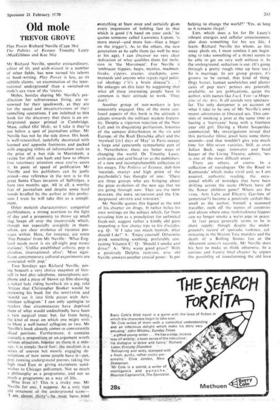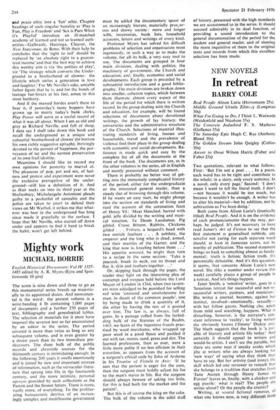Old mole
TREVOR GROVE
Play Power Richard Neville (Cape 38s) The Politics of Ecstasy Timothy Leary (MacGibbon and Kee 36s) Mr Richard Neville, spoofer extraordinary, editor of Oz and arch-wizard in a number of other fields, has now turned his talents to book-writing. Play Power is less, as its subtitle claims. an examination of the inter- national underground' than a switched-on mole's eye view of the 'sixties.
Moles, besides sharing Mr Neville's pre- dilection for subterranean living, are re- nowned for their spadework, as they are for the speed and imaginativeness of their tunnelling operations. I am indebted to this book for the discovery that there is an un- derground paper printed in Cambridge. Mass, called Old Mole, so I take it they're not below a spot of journalism either. Mr Neville has not let the side down. His book is well-researched, tastefully decorated with learned and apposite footnotes and packed with engaging titbits of information such as the price of a bus ride in Marrakesh, a recipe for chili con hash and how to obtain free veterinary attention once you've eaten it. _In point of speed of publication Mr Neville and his publishers can be justly proud—one reference in the text is to the great Santa Claus invasion of Selfridges, a bare two months ago. All in all, a worthy feat of journalism and despite some hard words levelled by the author at this profes- sion I trust he will take this as a compli- ment.
Other moleish characteristics: congenital purblindness, a strong aversion to the light of day and a propensity to throw up small slag heaps all over the Countryside which, though not especially unsightly in them- selves. are clear evidence of vacuous pas- sages within. Here, for instance, are some 'Pop Pensees' from Mr Neville: 'What Eng- land needs most is six all-night pop music stations'; 'Unlike established culture, pop is classless, international, alive'; 'Most signi- ficant contemporary cultural experiments.are associated with pop.
Two Sundays ago Richard Neville. pos- ing beneath a very choice snapshot of him- self in bed plus telephone, stereophonic ear- phone and a piece of blown up film showing a naked lady riding bareback on a pig, told Atticus that Christopher Booker would be reviewing his book for the SPECTATOR and 'would cut it into little pieces with Aris- totelean syllogism.' I can only apologise to readers that circumstances have deprived them of what would undoubtedly have been a rare surgical treat; but, far from being , the kind of meat on which one might wish to blunt a well-honed syllogism or two, Mr Neville's book already comes in conveniently sliced portions. Furthermore, it contains scarcely, a proposition or an argument worth serious, abjection. Insofar as there is a mes- age, it is simply `have fun'; the medium is a series of uneven but mostly engaging de- scriptions of how some people have it—pot, pop, running underground presses, taking the high road East or giving excrement sand- wiches to Chicago policemen. Not so much a philosophy as a programme, and not so much a programme as a way of life.
Who lives it? This is a tricky one. Mr Neville for one, I suppose. As a very ripe old ornament of the underground scene— am almost thirty'—he must have tried
everything at least once and certainly gives every impression of holding fast to that which is good ('A hand on your cock.' he quotes someone called Lawrence Lipton, 'is more moral—and more fun—than a finger on the trigger'). As to the others, the new generation as he calls them (as well he may at his age), I can discover no very clear indication of what qualifies them for inclu- sion in 'the Movement'. For Neville it 'embraces hippies, beats, mystics, madmen, freaks, yippies, crazies, crackpots, corn- munards and anyone who rejects rigid politi- cal ideology ("it's a brain disease") . . He enlarges on this later by suggesting that what all these interesting people have in common is their attitude to work. 'They don't.'
Another group of non-workers is less innocently engaged. One of the more con- fused aspects of this book is the attitude it adopts towards the militant student fratern- ity. Despite a vigorous rejection of the New Left and its disquieting puritanism, histories of the campus disturbances in the us and Europe, of the Rudi Dutschke affair and the 'mystical [sic] days of May' in Paris occupy a large and apparently sympathetic part of it. Nevertheless, there are better ways of changing the world. Dr Timothy Leary. arch-guru and acid head (or as the publishers of a new and incomprehensible collection of his essays. The Politics of Ecstasy, dub him 'messiah, martyr and high priest of the psychedelic') has thought of one: 'There are three groups who are bringing about the great evolution of the new age that we are going through now. They are the DOPE DEALERS, the ROCK MUSICIANS and the Un- derground ARTISTS and WRITERS.'
Mr Neville quotes this legend at the end of his chapter on drugs. It rather belies his own writings on the subject which, far from revealing him as a proselytiser for unlimited freak-out, suggest rather a kindly old guru imparting a few choice tips to his disciples. e.g. Q: 'If I take too much hashish, what should I do?' A: 'Enjoy yourself. Otherwise drink something soothing, preferably con- taining Vitamin C.' Q: 'Should.l smoke and drive?' A: 'Why waste good grass?' With a positively Delphic restraint, wise old Neville answers another crucial poser : 'Is pot helping to change the world?"Yes, as long as it remains illegal.'
LSD, which does a lot for Dr Leary's vibrant energies and cellular consciousness, also does something for his sex life, I learn. Richard Neville (to whom, as this essay plods on, I must confess I am begin- ning to take something of a shine) seems to be able to get on very well without it. In the underground, seduction is out. (It's going through a pretty rough time up here too.) So is marriage. In are group gropes, it's groovy to be carnal, that kind of thing. Orgy butter, human sandwiches and plaster casts of pop stars' penises are generally available; so are publications, quips the author, with names like Fuck You—a Maga- zine of the Arts. It all sounds very spectacu- lar. The only dampener is an account of what I take to be one of Mr Neville's own recent adventures in liberated sex. This con- sists of smoking a joint at the same time as having a 'hurricane' bang with a fourteen year old girl. During a Heinz Souperday commercial. My investigations reveal that this particular filmic jewel lasts some thirty seconds—and that wouldn't give you much time for fifty-seven varieties. Still, as even Julian Beck, sage, innovator and head keeper of the Living Theatre, admits, 'sex is one of the most difficult areas'.
There are others, of course. In a collection of travelogues 'On the Road to Katmandu' which make vivid and, so I am assured, authentic reading, the occa- sional whiffs of nostalgia that have been drifting across the scene (Where have all the flower children gone? Where are the UFOS. Arts Labs and Electric Gardens of yesteryear?) become a positively casbah-like smell as the author, himself a seasoned traveller, reels off the names of countries and places where once multitudinous hippies can no longer smoke a water-pipe in peace.
In fact peace generally seems to be in short supply; though despite the under- ground's record of sporadic violence, cul- minating in the Sharon Tate murders and the death of a Rolling Stones fan at the Altamont concert recently, Mr Neville does his best to make us think otherwise. In a curious and frantic final chapter he argues the possibility of transforming the old love and peace ethic into a 'fun' ethic. Chapter headings of such singular banality as 'Play is Fun, Play is Freedom' and 'Sex is Pure When it's Playful' introduce an ill-matched academy of learned and not so learned auth- orities—Galbraith, Huizinga, Cleaver, the New Statesman, de Bono. With their help he concludes that the 'right to toil' should be replaced by 'an absolute right to a guaran- teed income' and that the best way to achieve this worthy aim is via 'the politics of play', viz 'The strategy which converts the Under- ground to a brotherhood of clowns : the lifestyle which unites a generation in love and laughter.' For Mr Neville's sake, amiable father figure that he is, and for the bands of teenage fun-lovers at his feet, amen to this stout battlecry.
And if the massed hordes aren't there to hear it, if yesterday's teeny boppers have grown up to marry today's bank clerks, Play Power will serve as a useful record of what it was all about. When I am as old and grey as Richard Neville, and full of sleep, I dare say I shall take down this book and recall the underground as a unique and colourful 'brotherhood of clowns' (to borrow his own richly suggestive epitaph), thrivingly devoted to the pursuit of happiness, the pur- veyance of tat and the earnest preservation of its own frail identity.
Meantime I should like to record my own opinions for posterity to marvel at. The pleasures of pop, pot and sex, of lazi- ness and protest and experiment were never the exclusive prerogative of the under- ground—still less a definition of it. And as Hair rocks on into its third year at the Shaftesbury, Michelangelo Antonioni pleads guilty to a pocketful of cannabis and the police are taken to court to defend their views on Mr Warhol, it strikes me that what- ever was. best in the underground has long since made it gratefully to the surface. I hope that Mr Neville, who started off down under and appears to find it hard to break the habit, won't get left behind.



































 Previous page
Previous page